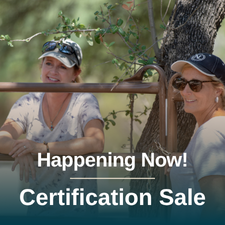By Laura McFarland and Bettina Shultz-Jobe
Natural Lifemanship Certification is a journey that involves taking the Fundamentals of NL and the NL Intensive and then seeing clients while occasionally meeting on zoom with seasoned NL practitioners to get individualized support regarding your specific clients, horses, facilities, funding sources, and more. Consultation and mentorship is the lifeblood of the certification process, and it is where we get to know you best and learn what you need from us most.
This year we have specially curated workshops for our conferences, Sunrise Summit and Sacred Landscapes, to address the top five concepts our students regularly tell us they are grappling with.
Concept # 1: Is it really necessary to use pressure or make requests?
For years we have been answering this question cognitively in blogs like this one, on consult calls, and in many of our trainings. Many of you have heard us communicate that pressure simply is. It exists implicitly in any relationship in the form of expectations and desires and it exists explicitly in the form of requests. It is literally gravity on our body, and is needed to help us wake up in the morning and move throughout life. Oftentimes, our mind follows this train of thought, but our body resists!
We all have a reaction to the word “pressure” – many of us have a complicated, sometimes even negative relationship with the word and idea. This year we are going to take a fresh look at the principles of pressure from a somatic perspective, so that you can explore your own personal relationship with pressure, energy, and requests – and how that relationship impacts your world both in and out of the round pen.
Our relationship with pressure is often the result of our most early attachments – when we explore our body’s experience of pressure we are standing on sacred ground – what better place to delve into this concept than at a conference dedicated to exploring the sacred landscapes within us and around us.
When Sacred Landscapes Roots Pass holders attend the November 8th workshop, “My Relationship to Pressure: Exploring a key principle to better understand the Natural Lifemanship process,” they can count it toward two consult hours as part of Basic NL Certification! (this is a savings of $350)
Concept #2: How do I increase my energy in a calm and connected manner?
This question is very much related to the first one. It comes up ALL the time. Once we realize that making requests is essential to building trust and connection in our relationships and we understand the concept of pressure intellectually, we may still struggle with managing pressure within our own bodies. For example, increasing pressure while using the least amount of energy (an NL principle) requires that we increase our body energy while staying present, calm and connected. This can be super challenging for any of us who have experienced an increase in body energy as something frightening or associated with disconnection, especially in our early relationships.
So, we asked Jennifer Harper, founder of Mindfulness with Horses and Little Flower Yoga, to tackle this topic: “Mindfulness with Horses: Not just for calming down!”
According to Jennifer (and we agree!), “Many people hear mindfulness and think about calming down. Slowing the breath, slowing the body, and finding stillness in the mind. While these can be powerful aspects of a mindfulness practice, they are only a small part of the story. Mindfulness supports our capacity to be present and embodied at ANY energy level. It offers us practices to stay regulated while accessing our power. Stay curious while increasing body energy. Stay grounded during big movement….”
In this 3 hour workshop Jennifer will guide you to explore ways to increase your energy without escalating emotion, supporting your ability to communicate clearly and powerfully with both horses and humans.
Concept #3: Detachment – do I really have to?
Detachment with connection is another area many people find themselves grappling with as they learn NL – another topic we have covered in blogs, webinars, and numerous trainings. Detachment (distance, space, boundaries) does not necessarily mean disconnection, yet it can certainly evoke anxiety, which we feel in our bodies. If you cringe at the thought of asking for detachment, you are not alone and we hear you!
Tim and Tanner Jobe are preparing a workshop you will not want to miss: “How to Stop Hating Detachment.” (We tried to come up with another title, but this one just stuck!)
In this workshop, Tim and Tanner Jobe will talk about and demonstrate how to harness the power of connected detachment to enhance relational development and reveal fun and exciting pathways for growth and even greater intimacy.
Concept #4: What about my horses’ relationships within their herd? What about their relationships with the EAS team? How do the NL principles apply?
The Natural Lifemanship principles extend to all of life’s relationships. This is why NL is such an effective approach to partnering horses and humans for therapeutic and learning purposes. However, in what ways do the NL principles extend to all of life’s relationships for our equine partners, who dwell in a herd and who spend their days working with their human partners offering equine-assisted services? We have several excellent workshops that will explore these two aspects of equine experience.
In “Getting Along: Facilitating Healthy Relationships within your (Horse) Herd”, Tim and Tanner Jobe share how they go about nurturing the bonds within the herd itself. This is super important to equine welfare and development, especially when equines are working in EAS settings.
Rebecca Hubbard and Reccia Jobe explore the ways in which the relational dynamics between equines and human practitioners impact the general healing landscape for clients participating in equine-assisted services. You won’t want to miss “The Human-Equine Relational Landscape: How Practitioner Treatment and Interactions with Equines Impact the Healing Landscape.”
In “Creating a Holistic Wellness Program for Your Horses: Incorporating Energy and Body Work” with Michelle Holling-Brooks you will be invited to look beyond the basic nutritional and traditional training needs of your horses. This session will dive into the different components of a truly holistic approach to working with and caring for our equine partners’ body, mind, and soul. You will also have the opportunity to learn and practice balancing your own energies as well, often the missing but key component.
Michelle Holling-Brooks will also present on “Developing the First Stages of Building a Secure Attachment for All (Including Horses) – Trust, Respect, and Willingness.” In this workshop you will explore the foundational skills needed to support clients and horses in building secure attachment. Michelle will introduce you to the first three pillars of what she calls the “Bridge of Connection” – building trust, respect, and willingness for ALL beings; horses and humans alike.
Dr. Amanda Massey is an AVCA certified animal chiropractor. In her presentation titled, “How to Assess your Horse’s Physical Discomfort to Help Them Thrive,” she will explore how stress impacts our equine partners. She will be giving demonstrations and sharing her experiences as an equine chiropractor to tell if your equine partner is experiencing discomfort from past traumas and how to improve their adaptation to environmental stressors with bodywork and chiropractic care.
Question #5: How do I integrate somatic work and movement into the services I provide?
We have numerous presentations, workshops, and practices that address this topic!
First of all, every single keynote will help you integrate the body and movement into your work and your life. Our community circle will guide you in the experience of some of these practices.
In “Healing Relationships with Place and Space: Engaging with the environment to foster transformation” Kate Naylor will guide us to consciously explore both space and place in our work, experiencing the deep healing that is found when we sink into our interdependence with the natural world, embracing the connection being offered in everything we do.
The keynote presentation with Mark Taylor and Bettina Shultz-Jobe, “Moving Through Space: What We Can Learn from Observing Movement in Session.” In this presentation, Mark introduces sixteen patterns of movement that allow us to move on land. You’ll learn to observe these movements within your own body, and how to observe patterns of movement when facilitating a client in session with a horse.
Another excellent movement focused workshop is offered by Kathy Taylor, who teaches: “Moving in Three Dimensions: A Simple Framework for Using Your Body to Establish, Maintain, and Nurture Connection While Working with Clients and Horses.”
Yet another workshop, “We Hold it All: A Sacred Root” by Jessica Benton, invites us to pay special attention to the root of our spine and pelvic floor and how this space in our bodies houses our emotions, histories, belief systems, and important functions. This root space deserves time, mindful connection, and healing.
Finally, in “Deepening the Satisfaction Cycle,” Mark Taylor invites participants to increase their sensory awareness of movement, to embody the Basic Neurological Patterns, and to explore their personal relationship to the elements of the Satisfaction Cycle (yield, push, reach, grasp, pull).
There is more! Check out the detailed schedule here.
So, why can this conference count toward certification for the first time ever?!!
Because the presentations listed above barely scratch the surface of what can be learned, experienced, and embodied at our conferences! The learning at this conference will be rich! You can read every single presentation description here if you want more detail!
If you are a Roots pass holder for the Sacred Landscapes conference, you may attend the “My Relationship to Pressure” session on Nov 8th and it will count for two individual consultations (a savings of $350!).
When you attend the Sunrise Summit (LIVE or watch at least 12 hours of recordings) and Sacred Landscapes in person either November 8th – 11th (Roots Pass) or 9th – 11th (Community Pass) you can apply the conference toward a speciality training, which is one of the requirements for Advanced Certification (a savings of up to $2,000 + travel and lodging!).
This is a bit of an experiment for us. There are so many presentations that we believe will profoundly contribute to your specialization in this field. We look forward to your feedback.
**To apply the NL conference toward a specialty training for Advanced NL Certification, you will intentionally choose your unique specialization path at the conference and share with us (in your certification course) how the conference contributed to your specialization in this field.
We hope to see you there!



Recent Comments